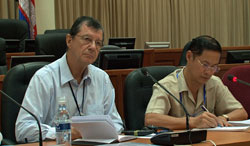An unusual hybrid court established by the United Nations and the government of Cambodia, the Extraordinary Chambers in the Courts of Cambodia is tasked with investigating and bringing to trial surviving Khmer Rouge officials charged with human rights abuses.
Working within the framework of international human rights law, but against the backdrop of a complex political arrangement with the government of Cambodia, the prosecution not only must prove the guilt of former high-ranking officials, but show that their crimes meet the judicial standards for war crimes, crimes against humanity, and even genocide.

The film follows Co-Investigating Judges Marcel Lemonde, from France, and You Bunleng, from Cambodia, as they investigate the first case, that of "Comrade Duch" (Kang Kek Iew), who oversaw the notorious Tuol Sleng (S-21) prison, where thousands of Cambodians were tortured and killed.
Working partly from information provided by Duch, the judges move to indict the four less cooperative, higher-ranking officials tried by the ECCC: Nuon Chea, "Brother Number Two" to Pol Pot; Khieu Samphan, President of the State Presidium; Ieng Sary, Deputy Prime Minister and Foreign Minister; and Ieng Thirith, Minister of Social Affairs.

We see the court's dogged efforts to prove these former officials' culpability in the brutality that characterized the regime. The filmmakers also show us the sometimes tense dynamic between the Cambodian and European judges as they discuss the question of bringing charges for genocide: You expresses the Cambodian people's desire for the officials to be charged with that crime in particular, and Lemonde suggests that their actions may not meet the judicial standards for doing so.
In showing the work of the ECCC, KHMER ROUGE: A SIMPLE MATTER OF JUSTICE sheds light on the still shadowy inner workings of the Khmer Rouge while illustrating the complex process of international human rights law.
"Offering fascinating insights into the challenges of bringing the elusive perpetrators of modern war crimes to justice, this is recommended." —Video Librarian
"Thanks to exceptional access, Remi Laine and Jean Raynaud managed to dive into the heart of the investigation implementing this historic trial and they allow us to understand all its political and judicial twists and turns." —Toute la culture
“Highly recommended for audiences interested in international law and the prosecution of war criminals. A comprehensive investigation!” —Cliff Glaviano, Educational Media Reviews Online (EMRO)
